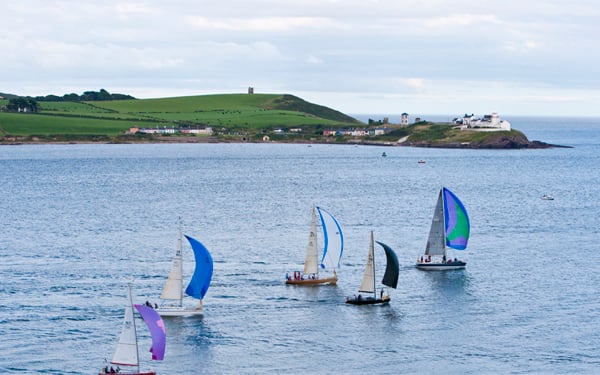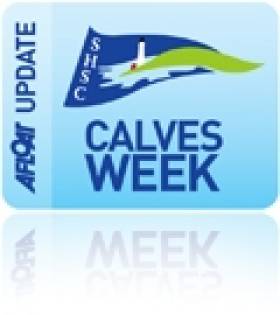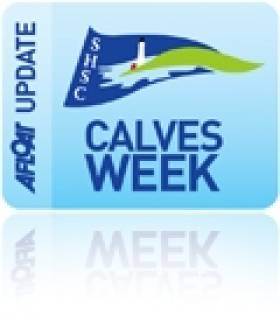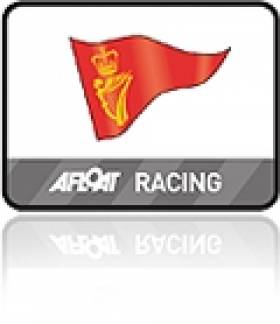Displaying items by tag: west cork
Spinnaker Run to Calves Week
The race continued to Schull where Donal O'Learys 'D Tox' took line honours finishing shortly after 7am. With numerous requests for redress, the race committee had a busy time sorting Class One results, which resulted in 'D Tox' taking first in both IRC and Echo, with Exhale and Saxon Senator filling second and third.
The spoils were shared in Class Two With Kieran O Briens 'Magnet' taking the IRC trophy, with the Barrett/Conlon team in 'Y Knot' winning Echo.
In the combined Classes Three and Four dogged determination finally paid off for Eddie Higgins and the crew of La Maraquita who, sailing the smallest boat in the race, crossed the Schull line in an elapsed time of sixteen and a half hours to capture the Echo trophy, with David Kenefick's 'Tiger' winning IRC.

West Cork bound. Photo: Robert Bateman
Compared with their companions from the previous night, the five White Sail boats that started from Kinsale on Saturday morning had an uneventful long slog to Schull where Bryan Heffernans 'Aisling' took first ahead of Doherty and Co in 'Free Spirit' and Julian Dockery's 'Flying Fish',while Kieran Dwyer's 'Brazen Huzzie' was the sole finisher in White Sail Two.
On Sunday the Wind Gods totally deserted Schull, where Race Officer Neill Prendeville was finally forced to fly the abandonment flag after a four hour postponement.
1720s make Calves Week Comeback
With over 60 confirmed entries at present, the 2010 Calves Week in Schull is expected to top the 80 boat mark for the annual West Cork festival of sailing. The week long sailing event is once again supported by the local business community together with sponsorship from Saab, Airtech Security and A&L Castors.
This year’s event will feature racing for eight cruiser classes, together with the growing West Cork 1720 fleet of sportsboats
Due to the dramatic increase in numbers, the White Sail fleet will be split into two, with a cut off point of approximately 35ft. Both fleets will begin the series in Kinsale, where they will start a daylight race to Schull at 8am on Saturday morning July 31st.
The cruiser fleets in Classes Zero, 1 and 2 will start the traditional Crosshaven/ Fastnet/Schull overnight race at an earlier time of 19.30 on Friday 30th from the Weavers Point line, while Classes 3 and 4 will sail a shorter course direct to Schull.
The opening reception and briefing has been moved from the event headquarters at the Fastnet Marine Centre to the Harbour View Hotel in Schull and will take place at 8.00 pm on Saturday 31st, and this venue will also host the final overall presentation of prizes on Sunday August 8th.
The first race from Schull will start on Sunday 1st August when the fleets will sail a variety of courses which will all finish in Baltimore in the late afternoon. Some of the boats will stay overnight for Monday’s regatta with the full fleet again resuming for battle in Schull on Tuesday morning where a costal race is scheduled.
On Wednesday the fleet will sail to Cape Clere Island for the fun regatta of the week. The racing boats will anchor in South Harbour while the support craft will tie up in North Harbour. This infamous event is run by the secret committee of the Cape Clere Yachting Association and has always proved to be the ideal location for the crews to “leave their hair down”
On Thursday the racing returns to Schull with a mid week presentation of trophies in the Courtyard on main street, while on Friday the fleet will round the Fastnet Rock with a finish in Crookhaven, where some of the boats remain overnight for the following days regatta.
The exhausting week will finally conclude on Sunday August 8th with Schull Regatta where racing will take place on a variety of courses in Roaring Water Bay, with the closing ceremony and overall presentation of trophies at 8.00 pm at the Harbour View Hotel.
Royal Cork Boats were well represented today (Sun) at Glandore Harbour Yacht Club At Home writes Claire Bateman. Mediterranean conditions prevailed with sun, wind and sparkling blue water. When conditions such as existed today prevail this is a little piece of paradise tucked away in West Cork surrounded by glorious scenery. It was apt that they were rewarded with these conditions for the celebration of their 25th anniversary. The mouth of the harbour is marked by the Adam and Eve Islands and the cruisers had a start south east of this point using Neil Prendeville's Mary P as committee boat and a race officer team that included event organiser Cormac O'Carroll. The 16 knot breeze outside the harbour was from the south west, while inside the harbour there was a lighter breeze that one would guess was more from the north west and this was where the Squibs were sailing their two day championship.
The club is a hive of activity in furthering its amenities and they are very actively raising funds for a new club house. They had a raffle for a new car on offer today to further this project. Also they had a novel event of a Pig Roast-Barbeque with great music by the Roaring Forties and were looking forward to a great night of entertainment.































































